NCERT Exemplar Class 7 Maths Chapter 4 Simple Equations are part of NCERT Exemplar Class 7 Maths. Here we have given NCERT Exemplar Class 7 Maths Solutions Chapter 4 Simple Equations.
NCERT Exemplar Class 7 Maths Solutions Chapter 4 Simple Equations
Directions: In the questions 1 to 18, there are four options out of which only one is correct. Choose the correct one.
Question 1.
The solution of the equation ax + b = 0 is
Solution:
(c) The equation is ax + b = 0
⇒ ax – b
\(\Rightarrow \quad x=\frac{-b}{a}\)
Solution is \(x=-\frac{b}{a}\)
Question 2.
If a and b are positive integers, then the solution of the equation ax = b will always be a
(a) positive number
(b) negative number
(c) 1
(d) o
Solution:
(a)
Question 3.
Which of the following is not allowed in a given equation?
(a) Adding the same number to both sides of the equation.
(b) Subtracting the same number from both sides of the equation.
(c) Multiplying both sides of the equation by the same non-zero number.
(d) Dividing both sides of the equation by the same number.
Solution:
(d) As dividing both sides of the equation by a non-zero number is allowed.
Question 4.
The solution of which of the following equation is neither a fraction nor an integer?
(a) 2x + 6 = 0
(b) 3x – 5 = 0
(c) 5x – 8 = x + 4
(d) 4x + 7 = x + 2
Solution:
(d) (a) 2x + 6 = 0
\(\Rightarrow \quad x=\frac{-6}{2}=-3\)
x=-3 is an integer
(b) 3x – 5 = 0
\(\Rightarrow \quad x=\frac{5}{3}\)
\(x=\frac{5}{3}\) is a fraction
(c) 5x – 8 = x +4
⇒ 5x – x = 4 + 8 ⇒ 4x = 12 ⇒ x = 3
x = 3 is an integer.
(d) 4x + 7 = x + 2
⇒ 4x – x = 2 – 7
⇒ 3x = -5
\(\Rightarrow x=\frac{-5}{3}\)
\(x=\frac{-5}{3}\) is neither a fraction nor an integer.
Question 5.
The equation which cannot be solved in integers is
(a) 5y – 3 = -18
(b) 3x – 9 = 0
(c) 3z + 8 = 3 + z
(d) 9y+ 8 = 4y – 7
Solution:
(c) (a) 5y – 3 = -18
⇒ 5y = -18+ 3 = -15
\(\Rightarrow y=\frac{-15}{5}=-3\)
y = -3 is an integer.
(b) 3x – 9 = 0
⇒ 3x = 9⇒ x = 3
x = 3 is an integer.
(c) 3z + 8 = 3 + z
⇒ 3z – z = 3 – 8 ⇒ 2z = -5
\(\Rightarrow z=\frac{-5}{2}\)
\(z=\frac{-5}{2}\) is not an integer.
(d) 9y + 8 = 4y – 7
⇒ 9y – 4y = -7 – 8 ⇒ 5y = -15
\(\Rightarrow y=\frac{-15}{5}=-3\)
y = -3 is an integer.
Question 6.
If 7x + 4 = 25, then x is equal to
(a) \(\frac{29}{7}\)
(b) \(\frac{100}{7}\)
(d) 3
(c) 2
Solution:
(d) 7x + 4 =25
⇒ 7x = 25 – 4
\(\Rightarrow x=\frac{21}{7}=3\)
∴ x = 3 is the solution.
Question 7.
The solution of the equation 3x + 7 = -20 is
(a) \(\frac{17}{7}\)
(b) -9
(c) 9
(d) \(\frac{13}{3}\)
Solution:
(b) 3x + 7 = -20
⇒ 3x = -20 – 7 = -27
\(\Rightarrow \quad x=\frac{-27}{3}=-9\)
∴ x = -9 is the solution.
Question 8.
The value of y for which the expression (y – 15) and (2y + 1) become equal is
(a) 0
(b) 16
(c) 8
(d) -16
Solution:
(d) y – 15 = 2y + 1
⇒ 2y – y = 15 – 1 =-16
⇒ y = -16
Question 9.
If k + 7 = 16, then the value of 8k – 72 is
(a) 0
(b) 1
(c) 112
(d) 56
Solution:
(a) Given that k + 7 = 16
⇒ k = 16 -7 = 9
∴ 8k – 72 = 8 × 9 – 72 = 72 – 72 = 0
Question 10.
If 43m = 0.086, then the value of mis
(a) 0.002 .
(b) 0.02
(c) 0.2
(d) 2
Solution:
(a) 43 m = 0.086
\(\Rightarrow \quad m=\frac{0.086}{43}=0.002\)
Question 11.
x exceeds 3 by 7, can be represented as
(a) x + 3 = 2
(b) x + 7 = 3
(c) x – 3 = 7
(d) x – 7 = 3
Solution:
(c) x exceeds 3 by 7, can be represented as x – 3 = 7.
Question 12.
The equation having 5 as a solution is:
(a) 4x + 1 = 2
(b) 3 – x = 8
(c) x – 5 = 3
(d) 3 + x = 8
Solution:
(d) (a) 4x + 1 = 2
⇒ 4x = 2 – 1 = 1
\(\Rightarrow x=\frac{1}{4}\)
(b) 3 – x = 8
⇒ x = 3 – 8 = -5
(c) x – 5 = 3
⇒ x = 3 + 5 = 8
(d) 3 + x = 8
⇒ x = 8 – 3 = 5
Thus, x = 5 is a solution of equation 3 + x = 8.
Question 13.
The equation having -3 as a solution is:
(a) x + 3 = 1
(b) 8 + 2x = 3
(c) 10 + 3x = 1
(d) 2x + 1 = 3
Solution:
(c) (a) x + 3 = 1
⇒ x = 1 – 3 = -2
(b) 8 + 2x = 3
⇒ 2x = 3 – 8 = -5
\(\Rightarrow \quad x=\frac{-5}{2}\)
(c) 10 + 3x = 1
⇒ 3x = 1 – 10 = -9
⇒ x = -3
(d) 2x + 1 = 3
⇒ 2x = 3 – 1 = 2 ⇒ x = 1
Thus, x = -3 is a solution of 10 + 3x = 1
Question 14.
Which of the following equations can be formed starting with x = 0?
(a) 2x + 1 = -1
(b) \(\frac{x}{2}+5=7\)
(c) 3x – 1 = -1
(d) 3x – 1 = 1
Solution:
(c) (a) 2x + 1 = -1
⇒ 2x = -1 – 1 = -2 ⇒ x = -1
(b) \(\frac{x}{2}+5=7\)
\(\Rightarrow \frac{x}{2}=7-5=2 \Rightarrow x=4\)
(c) 3x – 1 = -1
⇒ 3x = -1 +1 =0 ⇒ x = 0
(d) 3x – 1 = 1
⇒ 3x = 1 + 1 = 2
\(\Rightarrow x=\frac{2}{3}\)
Thus, equation 3x – 1 = -1 can be formed starting with x = 0.
Question 15.
Which of the following equations cannot be formed using the equation x = 7?
(a) 2x + 1 = 15
(b) 7x – 1 = 50
(c) x – 3 = 4
(d)\(\frac{x}{7}-1=0\)
Solution:
(b)
(a) 2x + 1 = 15
⇒ 2x = 15 – 1 = 14 ⇒ x = 7
(b) 7x – 1 = 50
⇒ 7x = 50 + 1 = 51
\(\Rightarrow \quad x=\frac{51}{7}\)
(c) x – 3 = 4
⇒ x = 4 + 3 = 7
(d) \(\frac{x}{7}-1=0\)
\(\Rightarrow \frac{x}{7}=1 \Rightarrow x=7\)
Thus, equation 7x – 1 = 50 cannot be formed using the equation x = 7.
Question 16.
If \(\frac{x}{2}=3\) then the value of 3x + 2 is
(a) 20
(b) 11
(c) \(\frac{13}{2}\)
(d) 8
Solution:
(a) Given that \(\frac{x}{2}=3\)
⇒ x = 3 × 2 = 6
∴ 3x + 2 = 3 × 6 + 2 = 18 + 2 = 20
Question 17.
Which of the following numbers satisfying the equation -6 + x = -12?
(a) 2
(b) 6
(c) -6
(d) -2
Solution:
(c) -6 + x = -12
⇒ x = -12 + 6 = -6
Thus, -6 satisfy the given equation.
Question 18.
Shifting one term from one side of an equation to another side with a change of sign is known as
(a) commutativity
(b) transposition
(c) distributivity
(d) associativity
Solution:
(b)
Directions: In questions 19 to 48, fill in the blanks to make the statements true.
Question 19.
The sum of two numbers is 60 and their difference is 30.
(a) If smaller number is x, the other number is ________ (use sum)
(b) The difference of numbers in term of x is _________
(c) The equation formed is _______
(d) The solution of the equation is _________
(e) The numbers are _______ and ________
Solution:
Let smaller number be x.
∴ Other number would be 60 – x .
According to question, 60 – x – x = 30
⇒ 60 – 2x = 30
⇒ 60 – 30 = 2x ⇒ 30 = 2x
\(\Rightarrow x=\frac{30}{2}=15\)
∴ 60 – x = 60 – 15 = 45
(a) 60 – x
(b) 60 – 2x
(c) 2x – 30
(d) – 15
(e) 15, 45
Question 20.
Sum of two numbers is 81. One is twice the other.
(a) If smaller number is x, the other number is ________
(b) The equation formed is ________
(c) The solution of the equation is _______
(d) The numbers are _______ and _______
Solution:
Let smaller number be x.
∴ Other number would be 81 – x or 2x
According to question, 2x = 81 – x
⇒ 3x = 81
\(\Rightarrow \quad x=\frac{81}{3}=27\)
∴ 2x = 2 × 27 = 54
(a) 81 – x or 2x
(b) 2x = 81 – x
(c) x = 27
(d) 27, 54
Question 21.
In a test, Abha gets twice the marks as that of Palak. Two times Abha’s marks and three times Palak’s marks make 280.
(a) If Palak gets x marks, Abha gets ______ marks.
(b) The equation formed is _______
(c) The solution of the equation is _______
(d) Marks obtained by Abha are __________
Solution:
Let Palak gets marks.
∴ Abha gets 2x marks.
According to question, 2(2x) + 3(x) = 280
⇒ 4x + 3x = 280
⇒ 7x = 280
\(\Rightarrow \quad x=\frac{280}{7}=40\)
∴ 2x = 2 × 40 = 850
(a) 2x
(b) 4x + 3x = 280
(c) x = 40
(d) 80
Question 22.
The length of a rectangle is two times its breadth. Its perimeter is 60 cm.
(a) If the breadth of rectangle is x cm, the length of the rectangle is __________
(b) Perimeter in terms of x is _________
(c) The equation formed is _________
(d) The solution of the equation is _________
Solution:
Let breadth of the rectangle be x cm.
∴ Length of the rectangle would be 2x cm
∴ Perimeter of the rectangle = 2(2x + x) = 6x
According to question,
\(\Rightarrow \quad x=\frac{60}{6}=10\)
∴ 2x = 2 × 10 = 20
(a) 2x
(b) 2(2x + x) or 6x
(c) 6x = 60
(d) x = 10
Question 23.
In a bag there are 5 and 2 rupee coins. If they are equal in number and their worth is 70, then
(a) The worth of x coins of 5 each is _________
(b) The worth of x coins of each is ________
(c) The equation formed is ________
(d) There are ______ 5 rupee coins and ______ 2 rupee coins.
Solution:
Let 2 rupee coins are x in numbers.
∴ 5 rupee coins also are x in numbers.
According to question, 2x + 5x = 70
⇒ 7x = 70
\(\Rightarrow x=\frac{70}{7}=10\)
(a) 5x
(b) 2x
(c) 2x + 5x = 70
(d) 10, 10
Question 24.
In a Mathematics quiz, 30 prizes consisting of 1st and 2nd prizes only are to be given. 1st and 2nd prizes are worth ₹ 2000 and ₹ 1000, respectively. If the total prize money is ₹52,000 then show that:
(a) If 1st prizes are x in number the number of 2nd prizes are ________
(b) The total value of prizes in terms of x are and________
(c) The equation formed is _________
(d) The solution of the equation is ________
(e) The number of 1st prizes is the number of 2nd prizes are ________
Solution:
Let 1st prizes are x in numbers.
∴ 2nd prizes are 30 – x in numbers.
According to question,
2000(x) +1000 (30 – x) = 52000
⇒ 2000x + 30000 – 1000x = 52000
⇒ 1000x + 30000 – 52000
⇒ 1000x = 52000 – 30000
⇒ 1000x = 22000
\(\Rightarrow x=\frac{22000}{1000}=22\)
∴30 – x = 30 – 22 = 8.
(a) 30
(b) 2000x + 1000(30 – x)
(c) 1000x + 30000 = 52000
(d) x = 22
(e) 22, 8
Question 25.
If z +3 = 5, then z = _______
Solution:
2 : z+ 3 = 5
⇒ z = 5 – 3 = 2
Question 26.
________ is the solution of the equation 3x – 2 = 7.
Solution:
3 : 3x – 2 = 7
⇒ 3x = 7 + 2 = 9
\(\Rightarrow \quad x=\frac{9}{3}=3\)
Thus, x-3 is the solution of the given equation
Question 27.
______ is the solution of 3x + 10 = 7.
Solution:
-1 : 3x + 10 = 7
⇒ 3x = 7 – 10 = -3
\(\Rightarrow \quad x=\frac{-3}{3}=-1\)
Thus x = -1 is the solution of the given equation.
Question 28.
If 2x + 3 = 5, then value of 3x + 2 is ________
Solution:
5: 2x + 3 = 5
⇒ 2x = 5 – 3 = 2
\(\Rightarrow x=\frac{2}{2}=1\)
∴ 3x + 2 = (3 × 1) + 2 = 3 + 2 = 5
Question 29.
In integers, 4x – 1 = 8 has ________ solution
Solution:
No: 4x – 1-8
⇒ 4x = 8 + 1 = 9
\(\Rightarrow x=\frac{9}{4}\)
which is not an integer,
Thus, 4x – 1 = 8 has no solution in integers.
Question 30.
In natural numbers, 4x + 5 = -7 has _______ solution.
Solution:
No: 4x + 5 = -7
⇒ 4x = -7 – 5 =- 12
\(\Rightarrow \quad x=\frac{-12}{4}=-3\)
which is not a natural number.
Thus, 4x + 5 = -7 has no solution in natural numbers.
Question 31.
In natural numbers, x – 5 =-5 has _________ solution.
Solution:
No: x – 5 = -5
⇒ x = -5 + 5 = 0
which is not a natural number.
Thus, x – 5 = -5 has no solution in natural numbers.
Question 32.
In whole numbers, x + 8 = 12 – 4 has _______ solution.
Solution:
One: x + 8 = 12 – 4
⇒ x + 8 = 8 ⇒ x = 8 – 8 = 0
Thus, x + 8 = 12 – 4 has one solution in whole numbers.
Question 33.
If 5 is added to three times a number, it becomes the same as 7 is subtracted from four times the same number. This fact can be represented as ________
Solution:
3x + 5 = 4x – 7 : Let the number be x.
∴ Thrice of number be 3x.
∴ Four times of number be 4x.
According to question, 3x + 5 = 4x – 7
Question 34.
x + 7 = 10 has the solution _________
Solution:
x = 3: x + 7 = 10
x = 10 – 7 = 3
Question 35.
x – 0 = _______when 3x = 12.
Solution:
4: 3x – 12
\(\Rightarrow \quad x=\frac{12}{3}=4\)
⇒ x – 0 = 4 – 0 = 4
Question 36.
x – 1 = _______; when 2x = 2.
Solution:
0 : 2x – 2
\(\Rightarrow x=\frac{2}{2}=1\)
⇒ x – 1 = 1 – 1 = 0
Question 37.
x ______ =15; when \(\frac{x}{2}=6\).
Solution:
\(-3 : \frac{x}{2}=6 \Rightarrow x=12\)
Let the required number be a
∴ 12 – a = 15 ⇒ 12 – 15 = a
⇒ -3 = a
Question 38.
The solution of the equation x + 15 = 19 is _______
Solution:
4 : x + 15 = 19
⇒ x = 19 – 15 = 4
Question 39.
Finding the value of a variable in a linear equation that_____ the equation is called a ______ of the equation.
Solution:
Satisfies, root: Value of a variable in a linear equation is the root of equation and satisfies it.
Question 40.
Any term of an equation may be transposed from one side of the equation to the other side of the equation by changing the of the term.
Solution:
Sign
Question 41.
If \(\frac{9}{5} x=\frac{18}{5}\) then x = ______
Solution:
\(2 : \frac{9}{5} x=\frac{18}{5}\)
\(\Rightarrow \quad x=\frac{18}{5} \times \frac{5}{9}=2\)
Question 42.
If 3 – x = -4, then x = ________
Solution:
7 : 3 – x = -4
⇒ -x = -4 – 3 = -7 ⇒ x = 7
Question 43.
If \(x-\frac{1}{2}=-\frac{1}{2}\), thenx=_______
Solution:
\(0 : x-\frac{1}{2}=\frac{-1}{2}\)
\(\Rightarrow \quad x=\frac{-1}{2}+\frac{1}{2}=0\)
Question 44.
If \(\frac{1}{6}-x=\frac{1}{6}\), then x = _______
Solution:
\(0 : \frac{1}{6}-x=\frac{1}{6}\)
\(\Rightarrow-x=\frac{1}{6}-\frac{1}{6}=0 \Rightarrow x=0\)
Question 45.
If 10 less than a number is 65, then the number is ______
Solution:
75 : Let the number be x.
∴ 10 less than this number be x – 10
According to question,
x – 10 = 65
⇒ x = 65 + 10 = 75
Question 46.
If a number is increased by 20, it becomes 45. Then the number is______
Solution:
25 : Let the number be x.
∴ Number increased by 20 is x + 20
According to question,
x + 20 = 45
⇒ x = 45 – 20 = 25
Question 47.
If 84 exceeds another number by 12, then the other number is ________
Solution:
72 : Let the number be x.
According to question, 84 = x + 12
⇒ x = 84 – 12 = 72
Question 48.
If \(x-\frac{7}{8}=\frac{7}{8}\) , then x = ______
Solution:
\(\frac{7}{4} : x-\frac{7}{8}=\frac{7}{8}\)
\(\Rightarrow x=\frac{7}{8}+\frac{7}{8}=\frac{14}{8} \Rightarrow x=\frac{7}{4}\)
Directions : In questions 49 to 55, state whether the statements are True or False.
Question 49.
5 is the solution of the equation 3x + 2 = 17.
Solution:
True
3x + 2 = 17
⇒ 3x = 17 – 2 = 15
\(\Rightarrow x=\frac{15}{3}=5\)
Thus, 5 is the solution of the equation 3x + 2 = 17
Question 50.
\(\frac{9}{5}\) is the solution of the equation 4x – 1 = 8.
Solution:
False
4x – 1 = 8
⇒ 4x = 8 + 1 =9
\(\Rightarrow x=\frac{9}{4}\)
Thus, \(\frac{9}{5}\) is not the solution of the equation.
Question 51.
4x – 5 = 7 does not have an integer as its solution.
Solution:
False
4x – 5 = 7
⇒ 4x = 12 ⇒ x= 3
i.e., x = 3 is the solution and it is an integer.
Question 52.
One third of a number added to itself gives 10, can be represented as \(\frac{x}{3}+10=x\)
Solution:
False
Let the number be x.
∴ One third of the number be \(\frac{x}{3}\)
According to question, \(\frac{x}{3}+x=10\)
Question 53.
\(\frac{3}{2}\) is the solution of the equation 8x – 5 = 7.
Solution:
True
8x – 5 = 7
⇒ 8x = 7 + 5 = 12
\(\Rightarrow x=\frac{12}{8}=\frac{3}{2}\)
Thus \(\frac{3}{2}\) is the solution of the equation 8x – 5 = 7
Question 54.
If 4x – 7 = 11, then x = 4.
Solution:
False
4x – 7 = 11
⇒ 4x = 11 + 7 = 18
\(\Rightarrow x=\frac{18}{4}=\frac{9}{2} \neq 4\)
Question 55.
If 9 is the solution of variable x in the equation \(\frac{5 x-7}{2}=y\), then the value of y is 28.
Solution:
False
\(\frac{5 x-7}{2}=y\)
Given that x = 9
∴ \(\frac{(5 \times 9)-7}{2}=y\)
\(\Rightarrow \frac{45-7}{2}=y\)
\(\Rightarrow \quad y=\frac{38}{2}=19\)
∴ y = 19, y ≠ 28.
Question 56.
Match each of the entries in Column 1 with the appropriate entries in Column II.
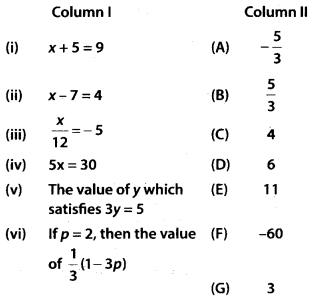
Solution:
(i) → (C);
(ii) → (E);
(iii) → (F)
(iv) → (D);
(v) (B);
(vi) → (A)
(i) x + 5 = 9 ⇒ x = 9 – 5 = 4
(ii) x – 7 = 4 ⇒ x = 4+ 7 = 11
(iii) \(\frac{x}{12}=-5 \Rightarrow x=-5 \times 12=-60\)
(iv) \(5 x=30 \Rightarrow x=\frac{30}{5}=6\)
(v) \(3 y=5 \Rightarrow y=\frac{5}{3}\)
(vi)Given that p = 2
∴ \(\frac{1}{3}(1-3 p)=\frac{1}{3}(1-3 \times 2)=\frac{1}{3}(1-6)=\frac{-5}{3}\)
Directions: In questions 57 to 67, express each of the given statements as an equation.
Question 57.
13 subtracted from twice of a number gives 3.
Solution:
Let the number be x. So, twice of number – 2x On subtracting 13 from it, we get 2x – 13 Therefore, 2x – 13 = 3 is the required equation
Question 58.
One-fifth of a number is 5 less than that number.
Solution:
Let the number be x.
So, one-fifth of number \(=\frac{x}{5}\)
Therefore,\(\frac{x}{5}=x-5\) is the required equation.
Question 59.
A number is 7 more than one-third of itself.
Solution:
Let the number be x.
So, one-third of number \(=\frac{x}{3}\)
7 more than \(\frac{x}{3}=\frac{x}{3}+7\)
Therefore, \(x=\frac{x}{3}+7\)is the required equation
Question 60.
Six times a number is 10 more than the number.
Solution:
Let the number be x.
So, six times of the number = 6x
Therefore, 6x – x + 10 is the required equation.
Question 61.
If 10 is subtracted from half of a number, the result is 4.
Solution:
Let the number be x.
So, half of the number \(=\frac{x}{2}\)
On subtracting 10 from it, we get \(\frac{x}{2}-10\)
Therefore \(\frac{x}{2}-10=4\) is the required equation.
Question 62.
Subtracting 5 from p, the result is 2.
Solution:
The number is p.
On subtracting 5 from it, we get p – 5
∴ p – 5 = 2 is the required equation.
Question 63.
Five times a number increased by 7 is 27.
Solution:
Let the number be x.
So, five times of the number = 5x
When increased by 7, it gives the expression 5x +7
∴ 5x + 7 = 27 is the required equation.
Question 64.
Mohan is 3 years older than Sohan. The sum of their ages is 43 years.
Solution:
Let Sohan is x years old.
So, Mohan is x + 3 years old.
∴ Sum of their ages be x + (x + 3).
∴ x + (x + 3) = 43 is the required equation.
Question 65.
If 1 is subtracted from a number and the difference is multiplied by \(\frac{1}{2}\) the result is 7.
Solution:
Let the number be x.
On subtracting 1 from it, we get x – 1
Multiplying it by \(\frac{1}{2}\) we get \(\frac{1}{2}(x-1)\)
∴ \( \frac{1}{2}(x-1)=7\) is the required equation.
Question 66.
A number divided by 2 and then increased by 5 is 9.
Solution:
Let the number be x.
Dividing the number by 2, we get \(\frac{x}{2}\)
When, increased by 5, it gives the expression
\(\frac{x}{2}+5\)
∴ \(\quad \frac{x}{2}+5=9\) is the required equation.
Question 67.
The sum of twice a number and 4 is 18.
Solution:
Let the number be x.
So, twice of the number = 2x
On adding 4 to it, we get 2x + 4
∴ 2x + 4 = 18 is the required equation.
Question 68.
The age of Sohan Lal is four times that of his son Amit. If the difference of their ages is 27 years, find the age of Amit.
Solution:
Let the age of Amit be x years.
So, age of Sohan Lal = 4x years
According to question, 4x – x = 27
\(\Rightarrow 3 x=27 \Rightarrow x=\frac{27}{3}=9\)
Thus, Amit is 9 years old.
Question 69.
A number exceeds the other number by 12. If their sum is 72, find the numbers.
Solution:
Let the number be x.
∴ Other number = x +12
According to question,
x + x + 12 = 72
⇒ 2x + 12 = 72 ⇒ 2x = 72 – 12 = 60
\(\Rightarrow \quad x=\frac{60}{2}=30\)
∴ x + 12 = 30 + 12 = 42
Hence, the numbers are 30 and 42
Question 70.
Seven times a number is 12 less than thirteen times the same number. Find the number.
Solution:
Let the number be x.
So, seven times of the number = 7x
Thirteen times of the number = 13x
According to question,
7x = 13x – 12
⇒ 12 = 13x – 7x
⇒ 6x = 12
\(\Rightarrow x=\frac{12}{6}=2\)
Thus, r -2 is the required number.
Question 71.
The interest received by Karim is ₹ 30 more than that of Ramesh. If the total interest received by them is ₹ 70, find the interest received by Ramesh.
Solution:
Let the interest received by Ramesh be x.
So, interest received by Karim = ₹ (30+ x)
According to question,
x + x + 30 = 70
⇒ 2x = 70 – 30
\(\Rightarrow \quad x=\frac{40}{2}=20\)
Thus, ₹ 20 is the interest received by Ramesh
Question 72.
Subramaniam and Naidu donate some money in a Relief Fund. The amount paid by Naidu is ₹ 125 more than that of Subramaniam. If the total money paid by them is ₹ 975, find the amount of money donated by Subramaniam.
Solution:
Let the amount of money donated by Subramaniam be x.
So, the amount paid by Naidu is= (x + 125)
According to question,
x + x + 125 = 975
⇒ 2x = 975 – 125 = 850
\(\Rightarrow \quad x=\frac{850}{2}=425\)
Thus, ₹425 is donated by Subramaniam.
Question 73.
In a school, the number of girls is 50 more than the number of boys. The total number of students is 1070. Find the number of girls.
Solution:
Let the number of girls be x.
So, the number of boys = x – 50
According to question,
x + x – 50 = 1070
⇒ 2x = 1070 + 50 = 1120
\(\Rightarrow \quad x=\frac{1120}{2}=560\)
Thus, 560 are girls.
Question 74.
Two times a number increased by 5 equals 9. Find the number.
Solution:
Let the number be x.
So, two times of the number = 2x
When, increased by 5, it gives the expression 2x + 5
∴ 2x + 5 = 9
⇒ 2x = 9 – 5 = 4
\(\Rightarrow x=\frac{4}{2}=2\)
Thus, x = 2 is the required number.
Question 75.
9 added to twice a number gives 13. Find the number.
Solution:
Let the number be x.
So, twice of the number = 2x
On adding 9 to it, we get 2x + 9
∴ 2x + 9 = 13
⇒ 2x = 13 – 9 = 4
\(\Rightarrow x=\frac{4}{2}=2\)
Thus, x = 2 is the required number.
Question 76.
1 subtracted from one-third of a number gives 1. Find the number.
Solution:
Let the number be x.
So, one third of the number \(=\frac{x}{3}\)
On subtracting 1 from it, we get \(\frac{x}{3}-1\)
∴ \(\frac{x}{3}-1=1\)
\(\Rightarrow \frac{x}{3}=1+1=2 \Rightarrow x=2 \times 3=6\)
Thus, x = 6 is the required number.
Question 77.
After 25 years, Rama will be 5 times as old as he is now. Find his present age.
Solution:
Let present age of Rama be x years.
So, five times of his age = 5x.
According to question,
5x = x + 25
⇒ 5x – x = 25
⇒ 4x = 25
\(\Rightarrow \quad x=\frac{25}{4}=6 \frac{1}{4}\).
Thus, at present Rama is \(6 \frac{1}{4}\) years old.
Question 78.
After 20 years, Manoj will be 5 times as old as he is now. Find his present age.
Solution:
Let present age of Manoj be x years.
So, five times of his age = 5x
According to question,
5 = x + 20
⇒ 5x – x = 20
⇒ 4x = 20
\(\Rightarrow x=\frac{20}{4}=5\)
Thus, at present Manoj is 5 years old.
Question 79.
My younger sister’s age today is 3 times, what it will be 3 years from now minus 3 times what her age was 3 years ago. Find her present age.
Solution:
Let present age of my younger sister be x years.
After 3 years, her age will be = (x + 3) years
Before 3 years, her age was = (x – 3) years
According to question,
x = 3 (x + 3) – 3 (x – 3)
⇒ x = 3 (x+3 – x + 3)
⇒ x = 3(6) = 18
Thus, at present my younger sister is 18 years old.
Question 80.
If 45 is added to half a number, the result is triple the number. Find the number.
Solution:
Let the number be x.
So, half of the number \(=\frac{x}{2}\)
On adding 45 to it, we get \(\frac{x}{2}+45\)
∴ \(\quad \frac{x}{2}+45=3 x\)
\(\Rightarrow \quad 3 x-\frac{x}{2}=45 \quad \Rightarrow \quad \frac{6 x-x}{2}=45\)
\(\Rightarrow 5 x=45 \times 2=90 \Rightarrow x=\frac{90}{5}=18\)
Question 81.
In a family, the consumption of wheat is 4 times that of rice. The total consumption of the two cereals is 80 kg. Find the quantities of rice and wheat consumed in the family.
Solution:
Let the quantity of rice consumed in the family be x kg.
So, quantity of wheat consumed = 4x kg
According to question, x + 4x = 80
⇒ 5x = 80
\(\Rightarrow \quad x=\frac{80}{5}=16\)
Thus, 16 kg rice consumed in the family and 4 × 16 = 64 kg wheat consumed in the family
Question 82.
In a bag, the number of one rupee coins is three times the number of two rupees coins. If the worth of the coins is 120, find the number of 1 rupee coins.
Solution:
Let two rupees coins are x in numbers.
So, one rupee coins are 3x in numbers.
According to question, 1(3x) + 2(x) = 120
⇒ 3x + 2x = 120
⇒ 5x = 120
\(\Rightarrow x=\frac{120}{5}=24\)
Thus, 3 × 24 – 72 coins are of one rupee coins.
Question 83.
Anamika thought of a number. She multiplied it by 2, added 5 to the product and obtained 17 as the result. What is the number she had thought of?
Solution:
Let the number Anamika thought be x.
Multiplying it by 2, we get 2x
On adding 5 to it, we get 2x + 5
∴ 2x + 5 = 17
⇒ 2x = 17 – 5 = 12
\(\Rightarrow \quad x=\frac{12}{2}=6\)
Thus, she had thought of number 6.
Question 84.
One of the two numbers is twice the other. The sum of the numbers is 12. Find the numbers.
Solution:
Let the one number be x.
So, other number = 2x
According to question,
x + 2x = 12
⇒ 3x = 12
\(\Rightarrow \quad x=\frac{12}{3}=4\)
∴ Other number is 2x = 2 × 4 = 8
Question 85.
The sum of three consecutive integers is 5 more than the smallest of the integers. Find the integers.
Solution:
Let the smallest integer be x
So, next two consecutive integer would be x + 1 and x + 2 respectively.
According to question,
x + x + 1 + x + 2 = x + 5
⇒ 3x + 3 = x + 5 ⇒ 3x – x = 5 – 3
⇒ 2x – 2 ⇒ x = 1
Thus, next two consecutive integers are 2 and 3 respectively.
Question 86.
A number when divided by 6 gives the quotient 6. What is the number?
Solution:
Let the number be x.
Dividing it by 6, we get \(\frac{x}{6}\)
∴ \(\frac{x}{6}=6 \Rightarrow x=6 \times 6=36\)
Thus, x = 36 is the required number.
Question 87.
The perimeter of a rectangle is 40 m. The length of the rectangle is 4 m less than 5 times its breadth. Find the length of the rectangle.
Solution:
Let the breadth of rectangle be x m.
So, five times of breadth = 5x
Therefore, length of rectangle = (5x – 4) m
Perimeter of rectangle = 40 m
⇒ 2(x + 5x – 4) = 40
⇒ 2(6x – 4) = 40 ⇒ 6x – 4 = 20
⇒ 6x = 20 + 4 = 24
\(\Rightarrow \quad x=\frac{24}{6}=4\)
Thus, length of rectangle = (5 × 4 – 4) = 16 m
Question 88.
Each of the 2 equal sides of an isosceles triangle is twice as large as the third side. If the perimeter of the triangle is 30 cm, find the length of each side of the triangle.
Solution:
Let length of equal sides of an isosceles triangle be 2x cm.
So, the third side of triangle x cm
Perimeter of triangle = 30 cm
⇒ x + 2x + 2x = 30
⇒ 5x = 30
\(\Rightarrow x=\frac{30}{5}=6\)
Thus, 6 cm, 12 cm and 12 cm are the required sides of the triangle.
Question 89.
The sum of two consecutive multiples of 2 is 18. Find the numbers.
Solution:
Let first multiple of 2 be x.
So, next multiple of 2 = x + 2
According to question,
x + x + 2 = 18 ⇒ 2x = 18 – 2 = 16
⇒ x = 8
Thus, 8 and 10 are required numbers.
Question 90.
Two complementary angles differ by 20<sup>o</sup>. Find the angles.
Solution:
Let one angle be x.
So, complement of x = 90°- x
According to question,
x – (90°- x) = 20°
⇒ x – 90° + x = 20°
⇒ 2x = 20° + 90° = 110°
\(\Rightarrow \quad x=\frac{110^{\circ}}{2}=55^{\circ}\)
∴ Complement of x = 90°- x = 90°- 55° = 35°
Thus, 55° and 35° are required complementary angles.
Question 91.
150 has been divided into two parts such that twice the first part is equal to the second part. Find the parts.
Solution:
Let first part be x
So, other part = 150 – x
According to question, 2x = 150 – x
⇒ 2x + x = 150 ⇒ 3x = 150
\(\Rightarrow x=\frac{150}{3}=50\)
Thus, other part = 150 – x = 150 – 50 = 100
Hence, 150 has been divided into 50 and 100.
Question 92.
In a class of 60 students, the number of girls is one third the number of boys. Find the number of girls and boys in the class.
Solution:
Let the number of boys in class = x
So, the number of girls in class = 60 – x
According to question,
\(60-x=\frac{x}{3}\)
⇒ 180 – 3x = x ⇒ 180 = 3x + x
⇒ 4x = 180
\(\Rightarrow \quad x=\frac{180}{4}=45\)
Thus, number of boys in the class = 45
And number of girls in the class = 60 – 45 = 15
Question 93.
Two-third of a number is greater than one third of the number by 3. Find the number.
Solution:
Let the number be x.
So, two-third of numbers \(=\frac{2}{3} x\)
According to question,
\(\frac{2}{3} x=\frac{1}{3} x+3\)
\(\Rightarrow \frac{2}{3} x-\frac{1}{3} x=3 \Rightarrow \frac{1}{3} x=3 \Rightarrow x=3 \times 3=9\)
Thus, x = 9 is the required number.
Question 94.
A number is as much greater than 27 as it is less than 73. Find the number.
Solution:
Let the number be x.
According to question,
x – 27 = 73 – x
⇒ x + x = 73 + 27 ⇒ 2x = 100
\(\Rightarrow \quad x=\frac{100}{2}=50\)
Thus, x = 50 is the required number.
Question 95.
A man travelled two fifth of his journey by train, one-third by bus, one-fourth by car and the remaming 3 km on foot. What is the length of his total journey?
Solution:
Let the length of total journey be x km.
∴ Journey by train = x km
∴ Joumey by bus \(=\frac{2}{5} x \mathrm{km}\) km
∴ Journey by car \(=\frac{1}{3} x \mathrm{km}\) km
And journey on foot \(=\frac{1}{4} x \mathrm{km}\) km
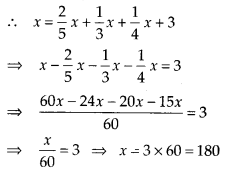
Thus, x = 180 km is the length of total journey
Question 96.
Twice a number added to half of itself equals 24. Find the number.
Solution:
Let the number be x.
According to question,
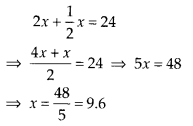
Thus, x = 9.6 is the required number.
Question 97.
Thrice a number decreased by 5 exceeds twice the number by 1. Find the number.
Solution:
Let the number be x.
So, thrice of the number = 3x
When it decreased by 5, we get 3x – 5
According to question,
3x – 5 = 2x + 1
⇒ 3x – 2x = 1 + 5 ⇒ x = 6
Thus, x = 6 is the required number.
Question 98.
A girl is 28 years younger than her father. The sum of their ages is 50 years. Find the ages of the girl and her father.
Solution:
Let the age of father be x years.
So, age of his girl = (x – 28) years
According to question,
x + x – 28 = 50
⇒ 2x = 50 + 28 = 78
\(\Rightarrow x=\frac{78}{2}=39\)
Thus, age of father = 39 years
And age of his girl = 11 years
Question 99.
The length of a rectangle is two times its width. The perimeter of the rectangle is 180 cm. Find the dimensions of the rectangle.
Solution:
Let the width of rectangle be x cm.
So, the length of rectangle = 2x
Perimeter of rectangle = 180 cm
⇒ 2(2x + x) = 180
\(\Rightarrow 3 x=\frac{180}{2}=90 \Rightarrow x=\frac{90}{3}=30\)
Thus, width of rectangle = 30 cm
And length of rectangle = 2 × 30 = 60 cm
Question 100.
Look at this riddle?
If she answers the riddle correctly however will she pay for the pencils?
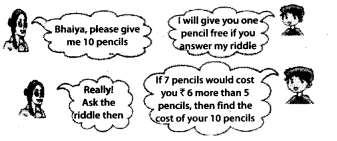
Solution:
Let the cost of one pencil be ₹ x
So, the cost of 5 pencils = ₹ 5x
Cost of 7 pencils = ₹ 7x
According to question,
7x = 5x + 6
⇒ 7x – 5x = 6
⇒ 2x = 6
\(\Rightarrow x=\frac{6}{2}=3\)
Cost of 10 pencils = ₹ (3 × 10) = ₹ 30
Question 101.
In a certain examination, a total of 3768 students secured first division in the years 2006 and 2007. The number of first division in 2007 exceeds those in 2006 by 34. How many students got first division in 2006?
Solution:
Let number of students got first division in 2006 be x.
So, the number of students got first division in 2007 = 3768 – x.
According to question,
3768 – x = x + 34
⇒ 3768 – 34 = x + x ⇒ 2x = 1867
\(\Rightarrow x=\frac{3734}{2}=1867\)
Thus, 1867 students got first division in 2006
Question 102.
Radha got ₹ 17,480 as her monthly salary and over time. Her salary exceeds the over-time by ₹ 10,000. What is her monthly salary?
Solution:
Let Radha’s monthly salary = ₹ x
So, money got by her in over time = ₹ (17480 – x)
According to question,
x = 17480 – x + 10000
⇒ x + x = 17480 + 10000
⇒ 2x = 27480
\(\Rightarrow x=\frac{27480}{2}=13740\)
Thus, 13740 is her monthly salary.
Question 103.
If one side of a square is represented by 18 – 20 and the adjacent side is represented by 42 – 13x, find the length of the side of the square.
Solution:
Since, square has all sides equal
∴ 18x – 20 = 42 – 13x
⇒ 18x + 13x = 42 + 20
⇒ 31x= 62
\(\Rightarrow x=\frac{62}{31}=2\)
∴ Side of square = 18 × 2 – 20 = 36 – 20 = 16
Thus, length of the side of the square is 16 units.
Question 104.
Follow the directions and correct the given incorrect equation, written in Roman numerals:
(a) Remove two of these matchsticks to make a valid equation:
![]()
(b) Remove one matchstick to make the equation valid. Find two different solutions.
![]()
Solution:
(a) Incorrect equation is

After removing two matchsticks the correct equation is
![]()
(b) Incorrect equation is
![]()
After removing one matchstick the correct equation is
![]()
Question 105.
What does a duck do when it flies upside down? The answer to this riddle is hidden in the equation given below:
If i + 69 = 70, then i = ?
If 8u = 6 +8, then u = ?
If 4a = -5a + 45, then a = ?
If 4q + 5 = 17, then q = ?
If – 5t – 60 = -70, then t = ?
If \(\frac{1}{4} s+98=100\), then s = ?
If \(\frac{5}{3} p+9=24\), then p=_____?
If 3c = c + 12, then c = ______?
If 3 (k+ 1) = 24, then k= _____?
For riddle answer : substitute the number for the letter it equals
![]()
Solution:
i + 69 = 70 ⇒ i = 70 – 69 = 1
8u = 6u +8 ⇒ 8u – 6u = 8
⇒ 2u = 8 ⇒ u = 4
4a = -5a + 45 ⇒ 4a + 5a = 45
⇒ 9a – 45 ⇒ a = 5
4q + 5 = 17 ⇒ 4q = 17 – 5
⇒ 4q = 12 ⇒ q = 3
-5t – 60 = – 70 ⇒ -5t = -70 + 60
⇒ -5t = -10 ⇒ t = 2
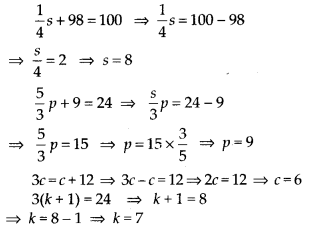
Thus, 1 = i, 2 = t, 3 = q, 4 = u, 5 = a, 6 = c, 7 = k, 8 = s, 9 = P
Substituting the letter for corresponding number in equation, we get ‘it quacks up’.
Question 106.
The three scales below are perfectly balanced if . = 3. What are the values of Δ and *?
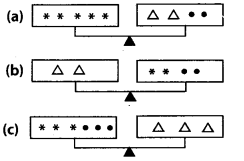
Solution:
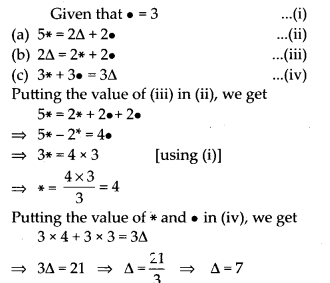
Question 107.
The given figure represents a weighing balance. The weights of some objects in the balance are given. Find the weight of each square and the circle.
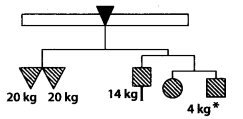
Solution:
From the weighing balance, we have
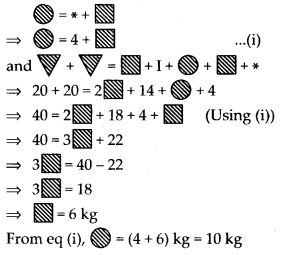
We hope the NCERT Exemplar Class 7 Maths Chapter Chapter 4 Simple Equations will help you. If you have any query regarding NCERT Exemplar Class 7 Maths Solutions Chapter Chapter 4 Simple Equations, drop a comment below and we will get back to you at the earliest.